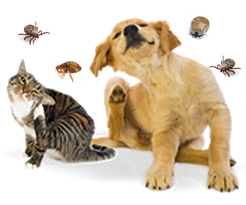Protecting your pets from parasites

Parasite infections in pets are one of the most common issues seen by the Greencross Vets team. It is easy to prevent your pet from contracting parasites if you take the right steps.
What are parasites?
Parasites are organisms that spend their lives on or inside our pets. They survive by taking nutrients from your pet, causing damage, discomfort, and debilitation if left untreated.
Some parasites, like worms, can even be transferred from animals to people. This is called a ‘zoonotic’ infection or disease. Although the risk of contracting a zoonotic infection is low, the consequences of infection with zoonotic diseases cannot be ignored.
Fortunately, there are many pet parasite preventatives available that will keep you and your pet safe. Your local Greencross Vet can assist with selecting the most appropriate product to suit the individual needs for your pet.
Continue reading to learn more about specific parasites and how you can protect your pet from them.
What parasites can affect my pet?
Fleas
Do you struggle with keeping your pet flea-free in warmer months? You’re not the only one! During the warmer months, fleas are getting ready to… read more
Ticks
What are paralysis ticks? Ticks are small parasites that inhabit mainly scrubby areas in the warmer, humid months of the year. They are foun… read more
Heartworm
Heartworm is a parasitic worm that is transmitted by mosquitos and infects dogs and cats. An infected mosquito bites the pet and injects a larval stage of the worm under the skin… read more
Intestinal Worms
Intestinal worms are parasites that all pet owners should worry about. Regular routine worming is so important yet it is often overlooked. As a rule, all puppies and kittens need to be wormed every two weeks until 12 weeks of age, then every month until they reach 6 months of age and then every 3 months for the rest of their life… read more
Giardia
What is Giardia? Giardia is a tiny microscopic protozoan parasite that is infectious to both humans and pets. Giardia have whip-like structures called “flagella & r… read more

 Greencross Vets
Greencross Vets 









